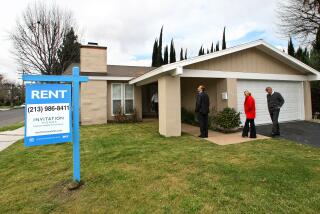Junk Fees Are What’s Behind That Great ‘Low Rate’
- Share via
Washington — WASHINGTON--If you refinanced a mortgage or bought a new home recently, were you mystified--or angered--by the number and costs of the fees you were charged?
Were there some charges on the settlement sheet that you had never heard of before, never understood, never challenged and simply let pass because you wanted to get the deal closed?
Did you feel nibbled to death by items such as a processing fee ($350), underwriting fee ($300), application fee ($250), settlement fee ($250), closing fee ($350), doc prep fee ($300), administrative fee ($250), legal fee ($250), endorsements fee ($95), escrow fee ($350), origination fee (1% to 2% of the loan amount), courier fees, discount fees, tax service fees and flood certification, to say nothing of the heavy title insurance expenses you were asked to pony up?
“Junk fees” and their legality have been a hot consumer subject this year. The U.S. Department of Housing and Urban Development has begun studying them intensively nationwide, with the help of a beefed-up enforcement budget. State financial regulators and attorneys general are looking for abuses as well.
And so should you. Consider just three facts:
* Lenders themselves admit that some of these fees are fictions--nothing more than creative devices to keep quoted interest rates low while still making money. That’s so you can think your 67/8% rate was a rock-bottom bargain.
* Federal law prohibits lenders or others from charging “unearned” fees for nonexistent goods or services. It also prohibits markups of settlement expenses when no additional services are rendered. The law carries heavy financial penalties and potential jail time, so the games many lenders play with fees can be dangerous.
* The “good faith estimates” of closing fees that all home-loan applicants are supposed to receive from lenders are legally toothless. When unscrupulous lenders want to pull you in with a low rate, they low ball on their good faith estimate disclosures--frequently by hundreds or thousands of dollars.
They know that while federal law requires them to give you the estimates within three business days of application, no federal agency has the enforcement authority to come after them if their estimates turn out to be far off the mark. They also know that most buyers or refinancers won’t walk from the settlement table, even if they’re miffed about unexpected fees.
Here’s one example of how the closing-cost shell game gets played. A homeowner applied in late November for a refinancing in Sacramento. The loan amount she needed was modest--$61,000, secured by property valued at $110,000.
She applied online to the Web-based affiliate of a national mortgage company and quickly received a set of settlement estimates for her 15-year, fixed-rate refi at 67/8%. She was stunned to discover that the long list of fees totaled $3,082--more than 5% of the entire mortgage amount.
Included in the expenses were $375 for processing, $350 for appraisal, $315 for escrow, $450 for settlement, a separate $200 for closing/settlement, $475.50 for origination, plus $708.20 in sundry title-related charges.
To get a professional evaluation of these fees, I asked two consumer-oriented lending experts for their thoughts.
“Garbage” was the one-word assessment of Jim Riley, president of San Diego’s City Line Mortgage Corp. “They can call stuff whatever they want,” he said, “but it’s still just income”--a way of making more money than it appears from the rate.
Riley said appraisers probably wouldn’t charge more than $200 to $250 to value the property, so someone was probably pocketing an extra $100 to $150 on the deal. The presence of two “settlement” or “closing” charge items in one transaction was another tip-off of a rip-off.
Paul E. Skeens of Carteret Mortgage Corp., a Fort Washington, Md., broker, had another take. He pointed out that in addition to high fees, the loan quote appeared to be half a percentage point higher than the prevailing market rate for 15-year fixed-rate loans on that day.
“So they might have been sticking it to [the applicant] two ways”--fluffed-up fees and a padded rate.
Skeens, who strongly defends his industry’s right “to earn a reasonable profit and pay overhead expenses like any other business,” nonetheless thinks many lenders have gotten greedy--and careless.
“You can make up names and invent fees,” he said, but when lenders intentionally low-ball estimates, “that’s going to get you into trouble.”
*]Next week: Policing junk fees.
Distributed by Washington Post Writers Group.
More to Read
Inside the business of entertainment
The Wide Shot brings you news, analysis and insights on everything from streaming wars to production — and what it all means for the future.
You may occasionally receive promotional content from the Los Angeles Times.










